Na’mal ameer, Hussain Tharallah X3
مداحی انگلیسی به یاد مسلمانان مظلوم نیجریه
Just like your Jaun
شبیه جون
I wish to give my life lying down in your hands
آرزو میکنم که جان دهم در حالی که میان دستان تو آرمیده باشم
I am your servant
من خادم شما هستم
Accept me my master take my hand in your hand
مولای من مرا بپذیر و دستم را در دستانت بگیر
Reward of the Martyred Companions
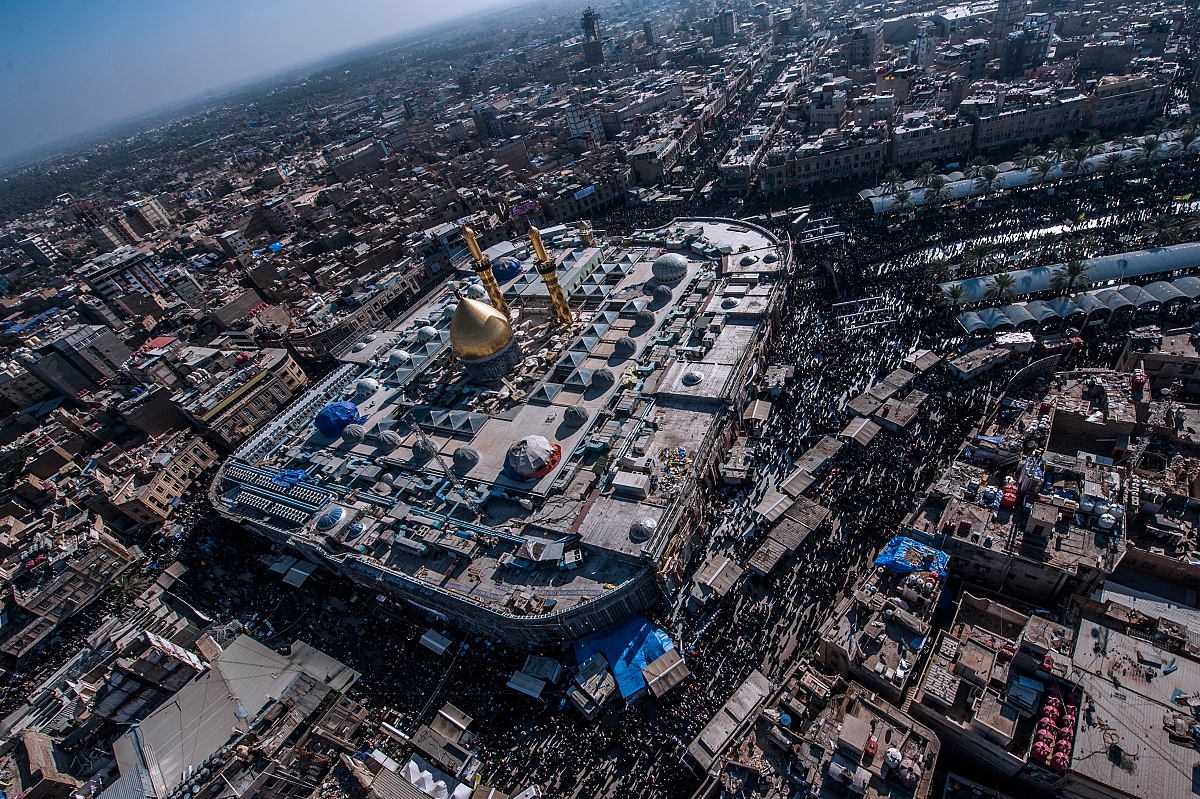
Reward of the Martyred Companions
قال الرضا (ع):
إن سرَّك أن يكون لك من الثواب مِثلُ ما لمَن استُشهد مع الحُسين فقُل متى ما ذكرته يا ليتني كُنت معهم فأفوز فوزاً عظيما
Imam Ridha’ (A.S.) said (to one of his companions): If you desire that for you be the reward equivalent to that of those martyred along with Husayn (A.S.), then whenever you remember him say: ‘ Oh! Would that I had been with them! A great achievement would I have achieved’.
Wasaail al‑Shia’h, vol. 14, pg. 501.
Laughing Eyes
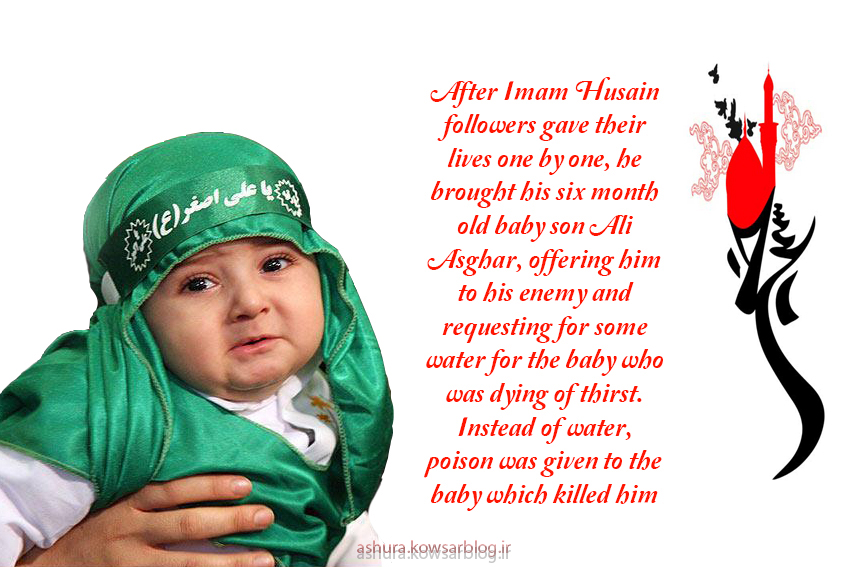
The Holy Prophet (S) said:
قال النبيُّ (ص):
يا فاطمة كلُّ عينٍ باكية يوم القيامة إلاَّ عينٌ بكَت على مُصاب الحُسين (ع) فإنها ضاحِكة مُستبشرة بنعيم الجنة
O’ Fatimah! Every eye shall be weeping on the Day of Judgment except the eye which has shed tears over the tragedy of Husayn (A.S.) for surely, that eye shall be laughing and shall be given the glad tidings of the bounties and comforts of Paradise.
Bihar al‑Anwar, vol. 44 pg. 193.
Muharram ,The Month of Mourning
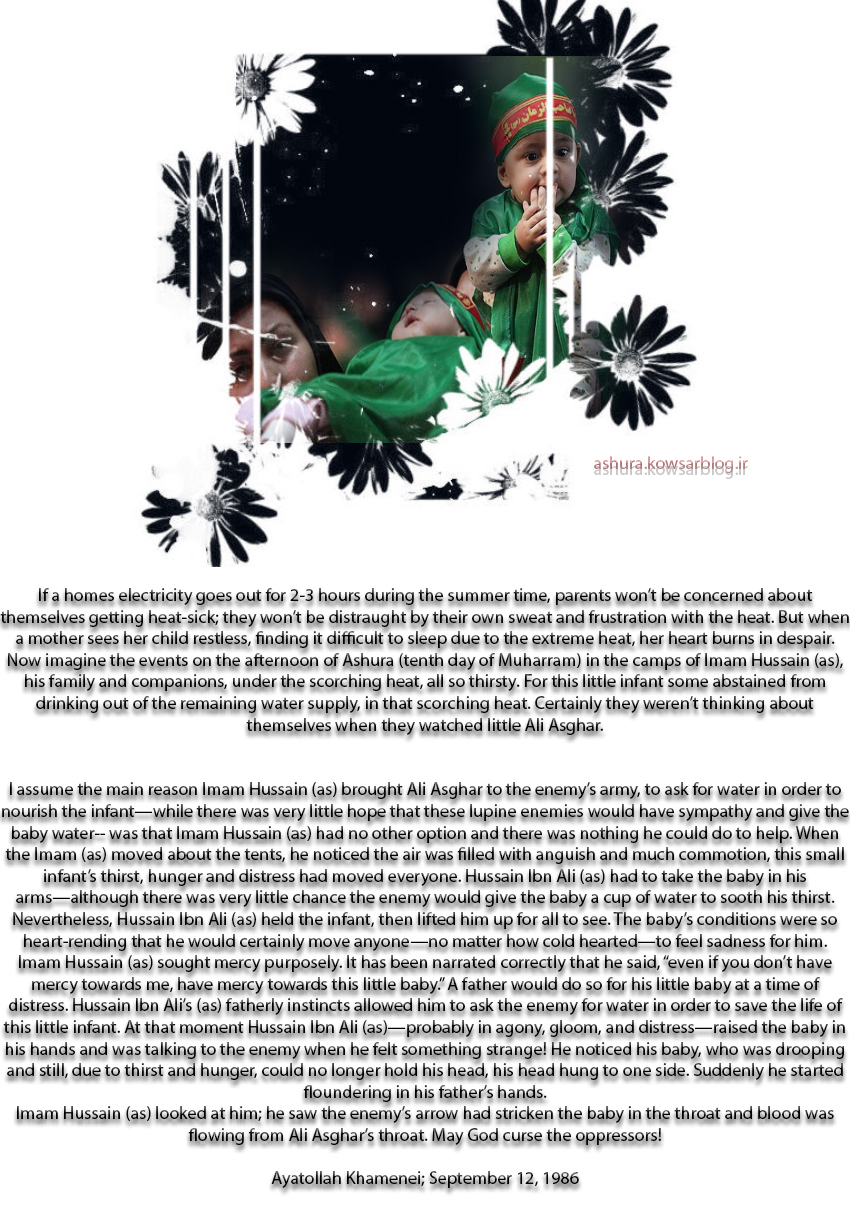
Muharram ,The Month of Mourning
Imam Ridha’ (A.S.) said:
قال الرضا (ع):
كان أبي (ع) إذا دخل شهر المُحرَّم لا يُرى ضاحِكاً وكانت الكابة تغلب عليه حتَّى تمضي عشرة أيَّام فإذا كان يوم العاشر كان ذلك يوم مصيبَته وحُزنه وبُكائه
With the advent of the month of Muharram, my father Imam Kadhim (A.S.) would never be seen laughing; gloom and sadness would overcome him for (the first) ten days of the month; and when the tenth day of the month would dawn, it would be a day of tragedy, grief and weeping for him.
We cry for Hussain (AS)
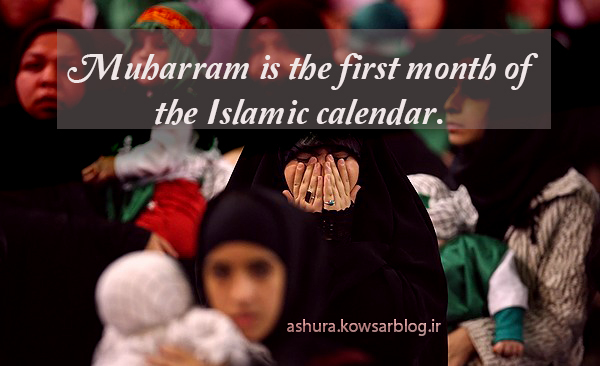
We cry for Hussain (AS) …So did the Prophet of Islam (S)
By Yasser al-Madani
Every year, Muslims around the world commemorate the tragedy of Karbala. They attend mourning meetings and processions in which the story of Karbala is retold, lamentations are held and special poetic readers using dramatic techniques and symbolism recite eulogies to mark the events of the day of Ashura. All these commemorative meetings not only serve to convey the events and message of Karbala but also provide opportunities for us to learn about Islam in general.
We commemorate Ashura’ to symbolise and express our grief and emotions towards the martyrdom of Imam al-Hussain (AS), to keep Imam al-Hussain’s (AS) cause alive in our hearts and to be committed to his cause. Also, we want to extract lessons from the tragedy of Karbala and apply them to our daily lives. We want to pay our condolences to the Holy Prophet (S) and the Ahlul Bayt (AS). You might then ask why we do not commemorate the death of the Holy Prophet (S) who has a much higher rank than Imam al-Hussain (AS). The answer to this is that although we do commemorate and mourn the death of the Holy Prophet (S), it is the way and circumstance in which Imam al-Hussain (AS) was martyred which makes all the difference, the fact that he was martyred for refusing a government headed by the wretched Yazid, who drank, gambled and indulged in many corrupt practices, the fact that those who savagely slaughtered Imam al-Hussain (AS) called themselves Muslims is what makes us mourn and lament his martyrdom the way we do.
Imagine, it is afternoon on the day of Ashura’. Imam al-Hussain (AS) is standing on the blood-drenched soil of Karbala in the heat of the scorching sun awaiting to meet his beloved. His head is wounded and blood is streaming slowly down his holy face soaking his blessed beard. He looks around, searching for members of his family and his companions, only to find them brutally slaughtered and slain like sacrificial lambs, lying there on the ground soaked in blood. He hears the innocent crying and wailing of the children and the women. Tears flow down his holy face. He takes a piece of cloth to wipe the blood from his face, whereupon an archer from the army of Yazid (may Allah’s curse be upon him) shoots a triple-headed arrow, which lodges into Imam al-Hussain’s (AS) heart.
Shiite day of Ashura for what cries
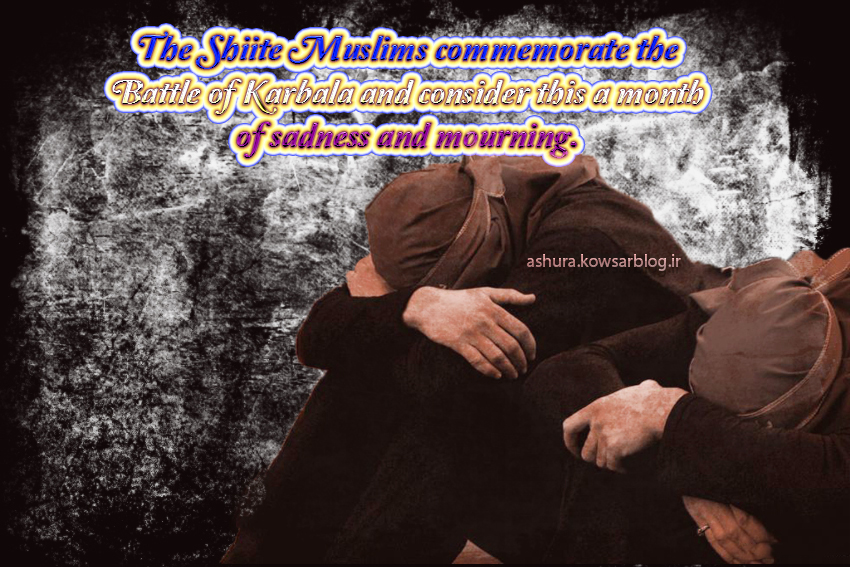
We commemorate Ashura’ to symbolise and express our grief and emotions towards the martyrdom of Imam al-Hussain (AS), to keep Imam al-Hussain’s (AS) cause alive in our hearts and to be committed to his cause. Also, we want to extract lessons from the tragedy of Karbala and apply them to our daily lives. We want to pay our condolences to the Holy Prophet (S) and the Ahlul Bayt (AS). You might then ask why we do not commemorate the death of the Holy Prophet (S) who has a much higher rank than Imam al-Hussain (AS). The answer to this is that although we do commemorate and mourn the death of the Holy Prophet (S), it is the way and circumstance in which Imam al-Hussain (AS) was martyred which makes all the difference, the fact that he was martyred for refusing a government headed by the wretched Yazid, who drank, gambled and indulged in many corrupt practices, the fact that those who savagely slaughtered Imam al-Hussain (AS) called themselves Muslims is what makes us mourn and lament his martyrdom the way we do.
day of ashura
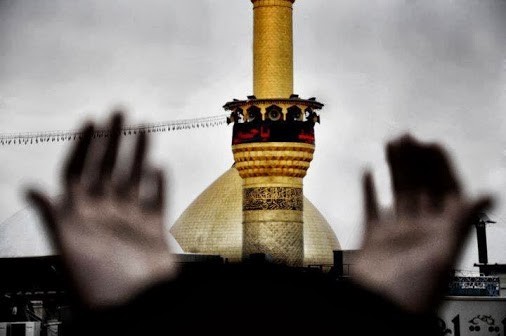
Every year, Muslims around the world commemorate the tragedy of Karbala. They attend mourning meetings and processions in which the story of Karbala is retold, lamentations are held and special poetic readers using dramatic techniques and symbolism recite eulogies to mark the events of the day of Ashura. All these commemorative meetings not only serve to convey the events and message of Karbala but also provide opportunities for us to learn about Islam in general